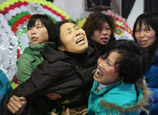
Key Words: Mali; French military;"serval";extremists;Paris;Francois Hollande;
Related Reading:
>> French ground troops head to north Mali as rebels resist
>> French forces heading towards Mali under military intervention
>> Germany to send two transport planes to Mali
French military intervention in Mali entered its seventh day on Thursday. Given the stark contrast between the military prowess of the French forces and the disorderly extremists, the world should not wait too long before Paris declares victory in the West African country.
French President Francois Hollande has vowed to destroy the "terrorists" in Mali, and he is not alone, as a number of Western and African countries have thrown their weight behind him. That there was a proper excuse for the intervention is beyond question, as he was invited by the Malian government to put down the rebels and believed to have the backing of the United Nations too.
Despite warning of the remote possibility that France might become mired in Mali, Hollande, as the first Socialist head of state in France since 1995, has put himself and his country in the spotlight, and won himself more clout on the diplomatic front, which will bolster French influence on the world arena.
True, stability in Mali is important, as the country sits on the doorstep of Europe, and fighting terrorists is a just cause.
Nonetheless, it is more important to provide sustainable assistance to African countries like Mali, so that they can embark on the road of poverty alleviation and economic development at an early date.
Mali is just a miniature of French-speaking countries on the continent. For years, tribal conflicts, religious rifts, abject poverty have mired these countries in instability and kept them on the list of the world's least developed countries.
Right now, at least three extremist groups - al-Qaida in the Islamic Maghreb, the Movement for Oneness and Jihad in West Africa and Ansar Dine (Defenders of the Faith) - are fighting in Mali. These groups have not emerged overnight. Their rise has been the result of long-time social turbulence and weak state power.
Apparently, military intervention is just the means to throttle extremists and terrorists in Mali. Countries like Mali still have a long way to go before they can shake off the shackles of poverty and put their shattered social fabrics together.
In the long run, the international community should step up efforts to support the integration process in Africa, improve its overall development level and create a desirable security environment for the development of the continent.
















 Railway staff members express Spring Festival greetings
Railway staff members express Spring Festival greetings


![]()
